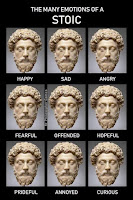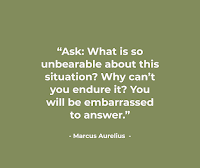The ancient philosophy of Stoicism provides valuable techniques to develop heightened mental health and emotional resilience in the present day. Understand and control your emotions using the Stoic philosophy of ancient Greek thinkers. Non-dogmatic wisdom and advice to help with self-improvement.
How Stoicism Can Improve Your Mental Health
Stoicism is an ancient philosophy rooted in the ethics of Greek and Roman culture. Through an exploration of Stoicism, you can develop healthier coping mechanisms, reshape perspectives on negative situations, as well as improve emotional resilience - making it a valuable tool for modern day psychological wellbeing. Stoicism is an ancient Greek philosophy of life designed to help individuals gain control over their emotions and lead better lives. It offers practical wisdom in the form of non-dogmatic advice, helping individuals adopt a more rational view of the world and make wise decisions that improve their quality of life.
Understand Who the Stoics Were and What They Believed In.
The Stoics were a school of philosophers that lived during the Hellenistic period in Ancient Greece. Their philosophy placed a strong emphasis on virtue and morality as the center pieces of their beliefs. They believed that people should free themselves from ignorance and strive to do what was right, ethical and natural. Moreover, they believed that focusing on the present moment and maintaining emotional poise was central to leading an ethical life. Understanding who the Stoics were and what they believed in is important if one wants to gain insight into the philosophical foundations of their thought process.

Learn the Nature of Natural Emotions
Stoic philosophy teaches that emotions such as fear, anger, and pride are natural responses to events in our lives. While these emotions can be beneficial when channeled properly, they can also lead to destructive behavior if not managed carefully. The Stoics advise that we must understand the nature of our own emotions and develop an attitude of rational acceptance to them in order to make better decisions in life.
Develop Stoic Discipline to Replace Impulsive Reactions
Stoic philosophy emphasizes the importance of self-discipline as a way to overcome our impulsive reactions and develop healthier behaviors. The Stoics believed that by training ourselves in the art of discipline we can eventually master our emotions, enabling us to make sound decisions even in challenging situations. They encouraged the practice of self-restraint, visualizing scenarios before they have happened, contemplating potential strategies and committing oneself to follow them through whatever difficulties may arise. Focus on What You Have Control Over.
One of the fundamental beliefs of Stoicism is to focus our energy on the things that we have control over and let go of what we cannot change. Within this way of thinking, there are two categories to consider - external forces, as well as internal thoughts and actions. By focusing your attention solely on the latter, you may practice better self-control and personal accountability in terms of deciding how you perceive events and handle any potential stressors.
Identify and Challenge Negative Thoughts and Feelings.
One way to practice Stoicism is by identifying and challenging negative thoughts or feelings. When you catch yourself feeling overwhelmed, anxious, or stressed try to remind yourself that many of these emotions arise from overthinking and ruminating on matters that we cannot control. Imposing a level of self-awareness can help us to rise above our negative thoughts in order to gain more clarity and understanding.
Reflect on Your Mortality.
One core principle of Stoicism is to reflect and be mindful of our mortality. In practice, this means to remind ourselves that life happens fast and moments will pass by quickly. This can help to give us perspective on the uncertainty of life but also motivate us to make the most of our time and not to let it go to waste. By recognizing that everything is transient - successes, failures, people - we can stay present and focused on what truly matters.
Avoid Comparisons and Negative Labels.
Stoicism teaches us to avoid comparing ourselves to others, as this can lead to damaging feelings of envy or unworthiness. The same applies for negative labels we may assign ourselves - things like “I’m not smart enough” or “that wasn’t good enough.” Instead of by-passing these thoughts, Stoics focus on being self-aware and on rising above that kind of mental chatter. By reflecting in a non-judgmental manner on our actions and motivations, we discover positive lessons and growth leading to improved mental health and emotional resilience.
Practice Self-Care and Acceptance of Life’s Uncertainties.
One of the core concepts of Stoicism is to accept that life is full of uncertainties, and that trying to control it can have negative emotional consequences. Once we accept this, we become capable of more self-care, countering difficult emotions like fear or anxiety. By allowing ourselves to take a step back and concentrating on our thought processes instead of tackling the external obstacles in front of us, we can bring our focus back to ourselves and start viewing the situation from a different perspective.
External links
Developing Character and Virtues Through Action.
Stoic philosophers highlight that practicing the principles of Stoicism is more important than simply understanding them intellectually. Ancient Stoics espoused the idea that external events, though beyond our control, can shape us only if we let them. To put it another way, we define ourselves not by what happens to us but by how we respond to what happens. This means that through intentional direction and appropriate action, we are able to build character and foster greater peace of mind.
Attachment, Unattachment and Practical Solutions in Life's Difficult Situations.
Stoicism teaches that managing our attachments is essential for living a life of contentment, peace and fulfillment. The practice of Unattachment involves eliminating unhealthy desires and cravings so that we can overcome suffering and reach a state of tranquility. Stoics also provide practical solutions for dealing with difficult situations. They suggest seeking out the advice of more experienced people, reviewing the facts carefully, postponing action if necessary, separating what a person can control from what they cannot control, and being aware that we cannot predict or even manage life’s outcomes.
Understand that Life Isn't Always Fair
An essential element of Stoicism is understanding that life isn't always fair, and trying to never convince ourselves that it should be. We must accept the fact that there will be situations in life where we won't get what we want, no matter how much effort we put forth or how hard we try. Instead of feeling powerless over these situations, focus on controlling our emotional reactions by reminding ourselves that both positive and negative experiences are an unavoidable part of life and embrace them with equanimity.
Find Meaning and Purpose in Your Experiences
Finding meaning and purpose in our experiences is an important principle of Stoicism. The Stoics taught that life should be lived intentionally, being mindful and aware of the world around us and actively striving to make positive contributions in our own lives and those of the people around us. By understanding our place in the grand scheme of things, we can learn to appreciate both our successes and failures equally because we understand their inherent worth in forming who we are today.
Discover the Principles of Stoicism Philosophy.
Stoicism is a belief system that focuses on the power of reason and understanding the universe. The principles of Stoicism include accepting life as it is, cultivating resilience and dealing with conflict by understanding right and wrong. They also involve accepting one’s emotions, striving to improve oneself by engaging in self-reflection, controlling desires, training thoughts and emotions, seeing the big picture, being humble and managing fear. Ultimately, Stoicism philosophy can provide vital insights into everyday life.
Cure Anxiety with Tranquility and Detachment
The Stoics believed that tranquility is the only way to overcome certain negative emotions, including anxiety. By maintaining a state of detachment and non-attachment to external things, you can keep yourself calm in the face of adversity. This enables you to rise above any negative thoughts or feelings and make rational decisions based on logical thinking instead of emotional responses. Tranquility improves our mental clarity and allows us to deal with difficult situations more effectively while remaining relaxed and composed.
Stoic quotes on stress
- “The mind that is anxious about future events is miserable.”
- “We suffer more often in imagination than in reality.”
- “You don’t develop courage by being happy in your relationships everyday. You develop it by surviving difficult times and challenging adversity.”
- “You need not look about for the reward of a just deed; a just deed in itself offers a still greater return.”
- “When you arise in the morning think of what a privilege it is to be alive, to think, to enjoy, to love …”
- “There is no genius without a touch of madness.”
- “We cannot choose our external circumstances, but we can always choose how we respond to them.”
- “You have power over your mind – not outside events. Realize this, and you will find strength.”
- “When you arise in the morning think of what a privilege it is to be alive, to think, to enjoy, to love…”
- “The happiness of your life depends upon the quality of your thoughts.”
- “If it is not right do not do it; if it is not true do not say it.”
- “Whenever you are about to find fault with someone, ask yourself the following question: What fault of mine most nearly resembles the one I am about to criticize?”
- “People are not disturbed by things, but by the views they take of them.”
- “Wealth consists not in having great possessions, but in having few wants.”
- “Man is not worried by real problems so much as by his imagined anxieties about real problems.”
- “First say to yourself what you would be; and then do what you have to do.”
- “Any person capable of angering you becomes your master; he can anger you only when you permit yourself to be disturbed by him.”
- “He who laughs at himself never runs out of things to laugh at.”
- “Caretake this moment. Immerse yourself in its particulars. Respond to this person, this challenge, this deed. Quit evasions. Stop giving yourself needless trouble. It is time to really live; to fully inhabit the situation you happen to be in now.”
- “It’s not because things are difficult that we dare not venture. It’s because we dare not venture that they are difficult.”
- “Luck is what happens when preparation meets opportunity.”
- “We suffer more often in imagination than in reality.”
- “Associate with people who are likely to improve you.”
- “Hang on to your youthful enthusiasms – you’ll be able to use them better when you’re older.”
- “If a man knows not to which port he sails, no wind is favorable.”
- “He suffers more than necessary, who suffers before it is necessary.”



Comments
Post a Comment